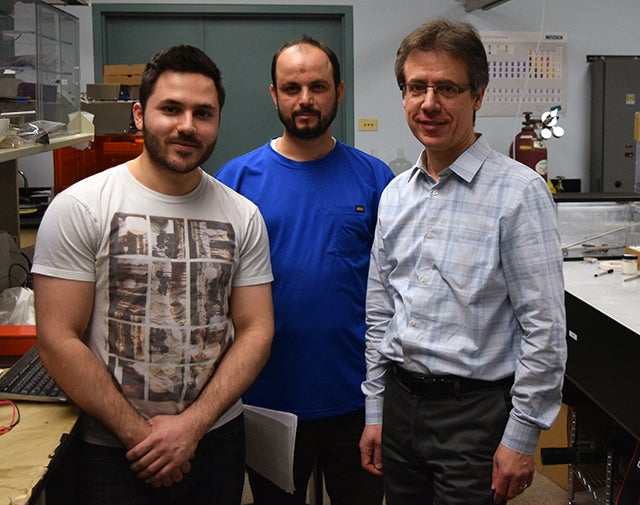Professor Constantine Megaridis awarded grant from Kimberly
story title Heading link

Industry Partnership Providing Students with Real-World Experience Researching Better Consumer Products
What is the secret to developing a great product? Engineering! Mechanical and industrial engineers are continuously researching how to make items better, and that includes everyday consumer products. One outlet for companies to develop better products is by partnering with universities.
At UIC’s Department of Mechanical and Industrial Engineering (MIE), Professor Constantine Megaridis has developed a strong relationship with Kimberly-Clark, which produces products such as facial tissue, paper towels, toilet paper, baby diapers, feminine pads and disposable training pants. The company is a world leader in providing essentials for a better life, and its global brands can be found in more than 175 countries.
Recently, Kimberly-Clark awarded Megaridis a grant for the project entitled “Rapid 3D Transport of Liquids in Porous Substrates.” The industry grant combines fundamental and applied research, and is a continuation of the support from the company, which has sponsored Megaridis’ research for the past several years.
The professor, who was named UIC’s Inventor of the Year in 2015, is working with the company to redesign parts of the products, reformulating, incorporating new materials, and developing new materials to achieve added functionality.
“This support is provided to improve the performance of some of [Kimberly-Clark’s] products,” said Megaridis, of Oak Park, Ill. “Most of these products contain absorbent materials for collecting cleaning solutions or water-based fluids. We are trying to figure out how to make the absorption better and more efficient, thus improving product functionality.”
Much of the research in Megaridis’ lab focuses on manipulating small amounts of fluids, particles or fibers. He and his group are using wet processes to manipulate tiny materials.
“Kimberly-Clark is biggest sponsor in our lab, and they have two different projects with us,” said Megaridis, who is the director of MIE’s Micro/Nanoscale Fluid Transport Laboratory. “Several Ph.D. students work on these projects, and we have been working with our Kimberly-Clark colleagues for several years now. Another project funded by Kimberly-Clark is in its sixth year, while the one we are discussing is in its second year.”
The second grant nearly doubles the size of the work Megaridis and his group are doing with the company. He and his students are researching everyday consumer products that need to undergo advancements, and this is benefiting the students in a variety of ways.
“The collaboration with Kimberly-Clark has been flourishing and going very well,” said Megaridis. “Students are earning their Ph.D.’s, we’re publishing in journals, writing patents, and co-authoring patents with the company. This is because of a revived openness by industry to work with the academic environments. They come in and describe their challenge, and then we work together to find solutions.”
The company, and other industry partners, work with Megaridis in the spirit of “open innovation,” the concept where companies (solution seekers) work with solution providers, like Megaridis. The work performed in his lab is related to a fundamental problem, thus there is fundamental science involved in these academic pursuits. That means, of course, that the research is very well suited for Ph.D. students.
A major advantage of the collaboration is joint ownership of the patents or intellectual property generated with the industry partners. Megaridis and his group have already produced several patents, and they have several others being examined.
“It’s a unique opportunity to have a student effectively develop their expertise and science for a problem with practical ramifications,” said Megaridis. “When a student gets involved with the fundamental questions of a technology, they find answers. And the answers are frequently patentable and publishable, eventually becoming part of their thesis.”
The students in his laboratory do very well after graduation. They join academia or the workforce with patents under their name, in which they are co-inventors. They also benefit financially, if there is money coming to UIC from these licenses.
“My students get multiple opportunities to work with industry partners in my lab,” said Megaridis. “This sets them up for good jobs down the road.”
Another benefit of the industry partnerships comes in the form of guidance from a corporate point of view.
“The companies provide a good sounding board if we want to test something,” said Megaridis. “They can guide us and prioritize what is important to them. They offer insightful and realistic guidance. It’s good for both parties.”
Research activities in the Micro/Nanoscale Fluid Transport Laboratory are funded by federal and industry sources and focus on fundamental and technological aspects of fluid and particle processes, especially at length scales ranging from the sub-millimeter regime down to the nanometer level. Specific emphasis is given to multifunctional coatings with extremely high or low wettability and their applications. Learn more about Professor Megaridis research at Micro/Nanoscale Fluid Transport Laboratory.